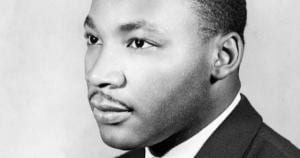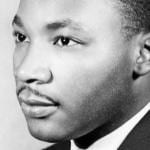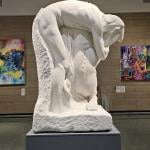 The African American Church had the experience and intellectual resources to produce and deal with one of the great American leaders of the last century: Martin Luther King Jr. The son of a pastor, descendant of other pastors, King was first a preacher. To understand anything else King did, one must being with King as preacher.
The African American Church had the experience and intellectual resources to produce and deal with one of the great American leaders of the last century: Martin Luther King Jr. The son of a pastor, descendant of other pastors, King was first a preacher. To understand anything else King did, one must being with King as preacher.
The start of the academic year at The College finds me reading King with ears to hear, today learning from The Dimensions of a Complete Life.
Rev. Dr. King begins with the apostle John imprisoned and yet seeing the complete City of God:
“And I saw a new heaven and a new earth. And I John saw the holy city, the new Jerusalem, coming down from God out of heaven.”
The City, King points out, is complete in length, breadth, and height. The Kingdom of Heaven is complete and so must be each individual in that kingdom. This image is the starting point for his sermon on the complete life.
King defines the terms this way:
Now the length of life as we shall use it here is the inward concern for one’s own welfare. In other words, it is that inward concern that causes one to push forward, to achieve his own goals and ambitions. The breadth of life as we shall use it here is the outward concern for the welfare of others. And the height of life is the upward reach for God. Now you got to have all three of these to have a complete life.
The inward concern is not mere selfishness, but self-love. King points out the need for the African-American community to embrace who they are. This is a powerful point and shows that the false teaching that self-love is always evil has been used to harm people over centuries. One does not avoid selfishness or hate by self-loathing.
After all, if we can love our enemies, we can surely love ourselves.
King reminds his congregation that while everyone is worthy of love, all of us have different gifts. He points to his own limitations. God has made each one us as we are. We can only do what we can do and we must accept that as well! This will allow us to flourish as human beings regardless of our calling. Every calling done joyfully is noble!
Just as King might seem to be falling to commencement address bromides, he pull us up:
A lot of people never get beyond the first dimension of life. They use other people as mere steps by which they can climb to their goals and their ambitions. These people don’t work out well in life. They may go for awhile, they may think they’re making it all right, but there is a law. They call it the law of gravitation in the physical universe, and it works, it’s final, it’s inexorable: whatever goes up can come down. You shall reap what you sow. God has structured the universe that way. And he who goes through life not concerned about others will be a subject, victim of this law.
To live a complete Christian life we must have an outward concern for others. This is the “breadth of life.” King points to the Good Samaritan in the parable of Jesus as one who gave breadth to his life by helping others. A key insight in the sermon comes as King reflects on the reasons that others did not help the injured man. He gives the usual answers (too rule bound, too churchy, too bigoted), but King then applies his own experience to point that they may also have been afraid. The road was dangerous and full of robbers. It was easier to keep going:
The first question that the Levite asked was, “If I stop to help this man, what will happen to me?” But the good Samaritan came by and he reversed the question. Not “What will happen to me if I stop to help this man?” but “What will happen to this man if I do not stop to help him?” This was why that man was good and great. He was great because he was willing to take a risk for humanity; he was willing to ask, “What will happen to this man?” not “What will happen to me?”
King reminds us that if we do not work for civil rights, feed the poor, vote, then what will happen to people? Our motive as Christians cannot always be mere self-love. This is one-dimensional and one dimensional people cannot live in the City Foursquare.
It seems as if I can hear the Lord of Life saying, “But I was hungry, and ye fed me not. I was sick, and ye visited me not. I was naked, and ye clothed me not. I was in prison, and you weren’t concerned about me. So get out of my face. What did you do for others?” This is the breadth of life.
The very best secular life advice might get so far, though not so eloquently. The dimension King argues must a human complete is the height: the reaching up to God. Atheism leaves us two-dimensional, but not all atheists deny God. There are practical atheists, King says, that know God is there, but never reach out to Him. Against this, against the death of God theology, King turns to God as the God Moses, the I AM:
You see, when I think about God, I know his name. He said somewhere, back in the Old Testament, “I want you to go out, Moses, and tell them ‘I Am’ sent you.” He said just to make it clear, let them know that “my last name is the same as my first, ‘I Am that I Am.’ Make that clear. I Am.” And God is the only being in the universe that can say “I Am” and put a period behind it.
This personal faith keeps him moving:
We were made for God, and we will be restless until we find rest in him. And I say to you this morning that this is the personal faith that has kept me going. I’m not worried about the future.
King discusses philosophical attempts to define God, with all their limitations, and turns his listeners another way:
Maybe we have to know him and discover him another way. One day you ought to rise up and say, “I know him because he’s a lily of the valley. He’s a bright and morning star. He’s a rose of Sharon. He’s a battle-axe in the time of Babylon.” And then somewhere you ought to just reach out and say, “He’s my everything. He’s my mother and my father. He’s my sister and my brother. He’s a friend to the friendless.” This is the God of the universe. And if you believe in him and worship him, something will happen in your life. You will smile when others around you are crying. This is the power of God.
This experience of God is absolutely necessary to give any meaning to any philosophical discussion! To discuss what it means for God to be love is tragic if we do so to avoid knowing the love of God! Rev. Dr. King is not anti-intellectual, but opposed to intellectualism. Knowing about a thing is good, knowing the thing is better. They need not contrast!
Moving in the Spirit is different than doing things are in our own strength. When we do our jobs, even loving ourselves and each other, in our own strength, good will be done. When the Spirit comes, the difference is amazing. You can hear that moment in this sermon for Rev. Dr. King. God help me to live this semester in three dimensions.
We do not need mere self-love, mere communitarian love, but divine love that can sent us forward against injustice.
This is the sermon for anyone at a transition point in life: going to college, finding a new job, considering a move. King moves deftly from the City Foursquare, through practical advice, to a vision of God.
Just so.
Listen to the sermon.
———————————————-
I have written about Rev. Dr. King (and his father!) several times. (Hopefully many of the obvious questions you might ask me regarding my opinions on Rev. Dr. King will be answered in the links.
As always with great books and leaders, especially on authors or topics on which I lack training, I begin as a student. First, I learn. Second, I apply what is true. Third, I consider what seems wrong. Fourth, I assume I am wrong for a goodly bit. Fifth, if I still think I am right, I express my ideas to a community to see!











